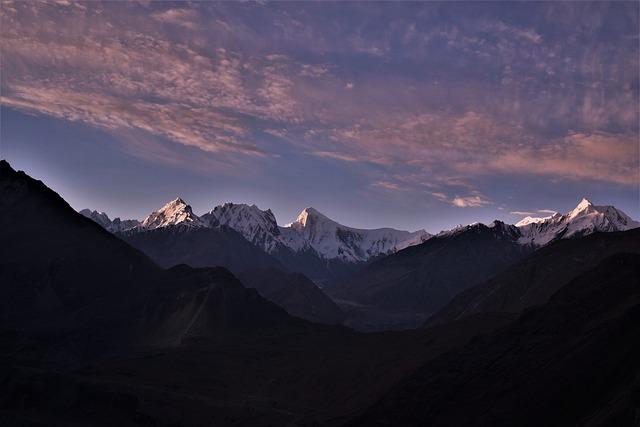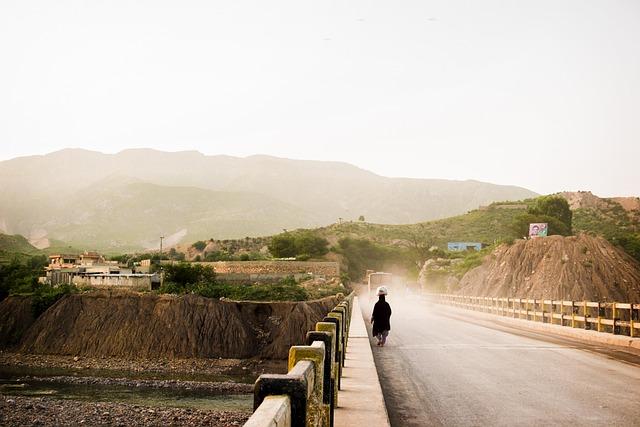Navigating Geopolitics: Pakistan’s Role in Global Relations
In a world increasingly defined by shifting alliances, territorial disputes, and economic rivalries, the role of nations on the global stage has never been more critical. At the crossroads of South Asia and the wider geopolitical landscape, Pakistan emerges as a significant player, wielding both historical weight and contemporary influence. This article embarks on a journey through the intricate tapestry of Pakistan’s interactions with its neighbors and beyond, shedding light on its strategic positioning, economic partnerships, and the complexities of its foreign relations. As we delve into the multidimensional forces shaping Pakistan’s role in global geopolitics, we uncover the nuances that define its relationships and the potential ramifications for regional stability and international diplomacy. Join us as we explore how Pakistan’s actions resonate far beyond its borders, echoing in the halls of power and the corridors of international discourse.
Understanding Pakistans Strategic Geographical Position in Global Politics
The geographical positioning of Pakistan serves as a critical juncture in contemporary global politics, uniquely placing it at the crossroads of South Asia, Central Asia, and the Middle East. This strategic location not only facilitates trade and energy transit but also enables Pakistan to exert influence on regional security dynamics. Furthermore, the proximity to major global powers like India and China, along with the ongoing developments in Afghanistan, solidifies its role as a central player in shaping geopolitical narratives. Key aspects of this position include:
- Access to key trade routes: Pakistan is home to the Gwadar Port, a pivotal maritime route that has the potential to connect landlocked Central Asia to international waters.
- Influence on regional security: The country’s relationships with neighboring countries impact stability in South Asia, pivotal in addressing terrorism and insurgency.
- Partnerships with major powers: Strategic alliances with nations such as China through initiatives like the China-Pakistan Economic Corridor (CPEC) enhance its geopolitical leverage.
Moreover, Pakistan’s role in global politics extends beyond mere geography; it involves intricate diplomacy shaped by historical contexts and current international relations. The nation’s military capabilities, coupled with a growing economy, allow it to participate in discussions on nuclear non-proliferation and counter-terrorism efforts, making it a significant stakeholder in not just regional but also global security frameworks. Key diplomatic relationships can be categorized as follows:
| Country | Nature of Relationship | Key Areas of Cooperation |
|---|---|---|
| China | Strategic Partnership | Economic Development, Military Cooperation |
| United States | Complex Ally | Security, Counter-Terrorism |
| India | Rivalry | Regional Security, Trade Tensions |
| Afghanistan | Bordering Neighbor | Terrorism, Refugee Issues |

Exploring Pakistans Bilateral Ties: Allies, Adversaries, and Opportunities
Pakistan’s geopolitical landscape is a complex tapestry woven through a history of alliances and rivalries that have shaped its international relationships. China stands out as a strategic ally, with the China-Pakistan Economic Corridor (CPEC) transforming infrastructure and economic ties into a robust partnership. This deep connection offers Pakistan an opportunity to leverage Chinese investment and technology, bolstering its economic growth amidst regional challenges. Conversely, relations with India illustrate ongoing tensions rooted in historical grievances, particularly concerning Kashmir. The adversarial stance fosters a security dilemma that influences Pakistan’s foreign policy, impacting its military expenditures and diplomatic engagements.
Looking beyond its immediate neighbors, Pakistan’s engagement with major powers reflects a nuanced approach towards cultivating economic and strategic alliances. Its ties with the United States have seen fluctuations, shifting between collaboration in counterterrorism and challenges over human rights and military funding. Similarly, relations with Russia, which have warmed in recent years, present an alternative avenue for diplomatic and military partnerships. Furthermore, participation in regional forums like the Shanghai Cooperation Organization facilitates deeper interactions with Central Asian states, emphasizing trade and energy cooperation. As Pakistan navigates these dynamics, the interplay of alliances and rivalries reveals a landscape rich with potential for both friction and opportunity.

Identifying Economic Paths: Enhancing Pakistans Role in International Trade
For Pakistan to truly harness its potential in international trade, it must first recognize and identify key economic paths that align with global trends. Strategic investments in sectors such as agriculture, textiles, and information technology can propel the country into competitive markets. By fostering innovation and entrepreneurship, Pakistan can create a resilient economy that attracts foreign investment. Furthermore, the establishment of special economic zones (SEZs) can facilitate trade and attract multinational corporations eager to capitalize on the country’s geographic advantages.
Engaging with regional and international partners is crucial for Pakistan to enhance its trading capacity. Strengthening relationships through bilateral trade agreements and multilateral collaborations can open new avenues. In addition, fostering ties with neighboring countries can lead to enhanced supply chain integration and the development of trade corridors. Key partnerships may include:
- China: Building on the China-Pakistan Economic Corridor (CPEC) to improve infrastructure and connectivity.
- Central Asia: Expanding trade routes to tap into energy resources and markets.
- Middle East: Strengthening ties to serve as a conduit for goods between Asia and the Gulf.

Recommendations for a Sustainable Foreign Policy: Strategies for Engagement and Diplomacy
To navigate the complexities of global relations, particularly in the context of Pakistan’s geopolitical landscape, several sustainable strategies for engagement and diplomacy must be prioritized. These strategies encompass a holistic approach that balances economic, environmental, and political interests, fostering a framework that allows for inclusive dialogue and mutual respect. Key measures include:
- Strengthening Bilateral and Multilateral Partnerships: Actively engaging with neighboring countries and key international players to cultivate collaborative agreements that drive regional stability and economic growth.
- Emphasizing Climate Diplomacy: Taking a leadership role in global environmental initiatives that highlight Pakistan’s vulnerability to climate change, while advocating for sustainable development practices.
- Cultural Diplomacy: Utilizing cultural exchanges and educational programs as tools for promoting mutual understanding and strengthening soft power across borders.
- Leveraging Technology and Innovation: Promoting technological cooperation with other nations to address global challenges such as health, education, and energy crises.
Moreover, transparent communication and a commitment to democratic values are essential for fostering trust and cooperation. Establishing track-two diplomacy initiatives can facilitate informal dialogues among non-governmental stakeholders, paving the way for innovative solutions to entrenched issues. Incorporating these elements not only enhances Pakistan’s credibility on the world stage but also contributes to a more stable and peaceful international environment. Here’s a concise overview of potential diplomatic initiatives:
| Initiative | Objective | Expected Outcome |
|---|---|---|
| Climate Collaboration | Engagement with neighboring countries on climate initiatives | Enhanced regional resilience to climate impacts |
| Cultural Exchange Programs | Fostering mutual understanding through arts and education | Stronger people-to-people connections |
| Joint Health Initiatives | Collaborative strategies to combat health crises | Improved public health outcomes |
To Conclude
In the complex tapestry of global politics, Pakistan emerges as a significant thread woven through the fabric of international relations. As we’ve explored, the country’s strategic location, rich cultural heritage, and historical alliances position it as a pivotal player on the world stage. While the challenges Pakistan faces are numerous, from economic hurdles to security concerns, its resilience and adaptability offer a glimpse into the possibilities that lie ahead.
As nations grapple with shifting alliances, emerging economies, and increasing geopolitical tensions, Pakistan’s role will likely evolve further, offering both opportunities and challenges. The dance of diplomacy is intricate, requiring finesse, understanding, and a commitment to multilayered dialogue.
Moving forward, it will be crucial for Pakistan to navigate these waters with prudence, leveraging its relationships and cultural ties to forge a path that benefits not just its own populace but also contributes to the broader landscape of global stability. In a world that is increasingly interconnected, one can only hope that Pakistan’s journey will ultimately lead to greater understanding, collaboration, and peace among nations. Each step taken in this direction is a step worth monitoring, as the implications of these dynamics will ripple across borders, shaping the future for generations to come.



